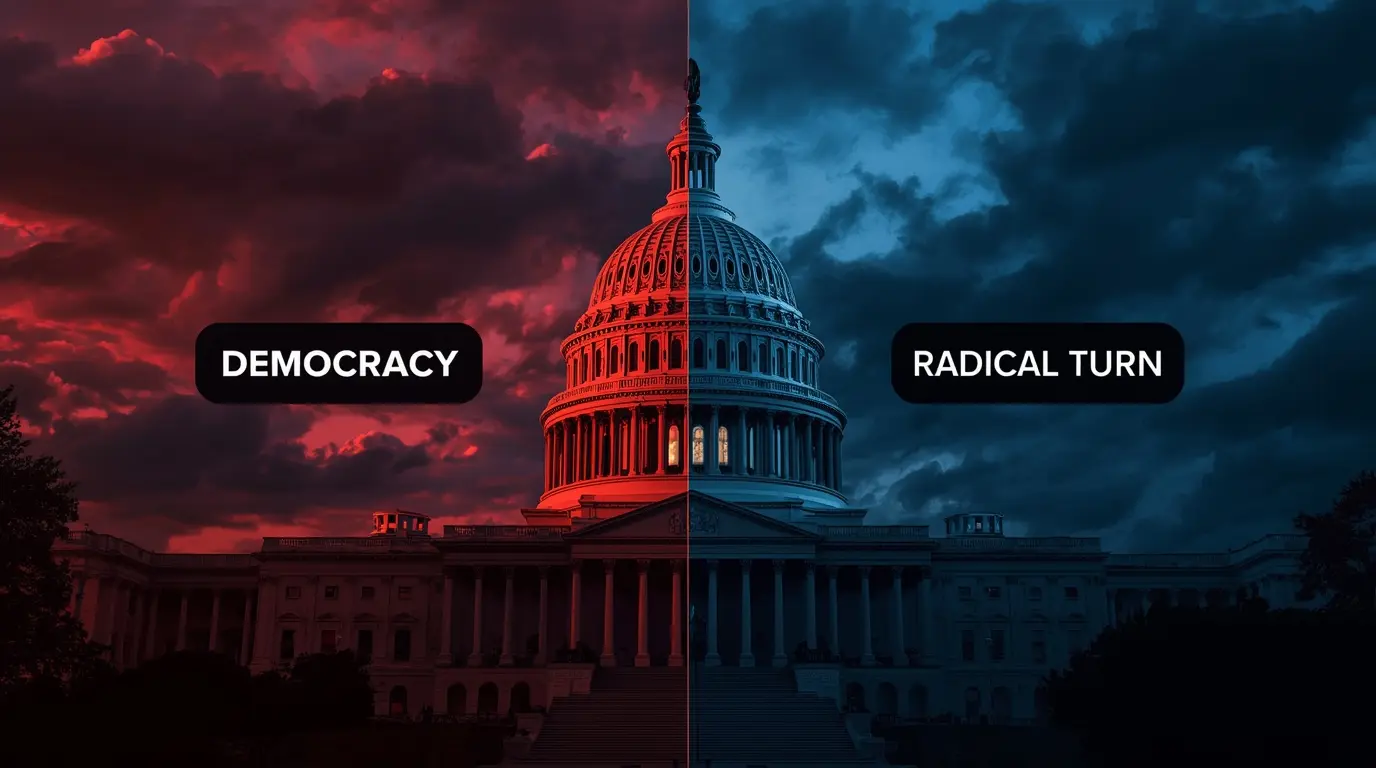Trump Reshapes American Governance RADICAL Turn
President Trump has taken a radical turn during his second term, the foundations of American democracy are starting to shake, and his turn is being characterized as radical even by his own standards. We are starting to see the consequences of his aggressive behavior, like the recent indictment of former FBI Director James Comey after Trump directly pressured him to do so. This is one of the many indicators of how different his second term is.
Trump has shown no restraint and has taken a radical turn with his consolidation of power as he leaves democracy and the democratic institutions unchallenged and disassembled. Most governance watchdogs, former allies, and critics are becoming more and more alarmed as Trump keeps radical consolidation.
At the center of this radical turn is the indictment of James Comey, which was secured just days after Trump publicly called for it. This marks a profound departure from even Trump’s past tactics, where he once pressured the system, he now appears to control it directly.
Former Trump White House counsel Ty Cobb characterized the indictment as a “clear vindictive and selective prosecution.” He warned this might be “the end of the rule of law in America” or a tipping point into a much more centralized and politicized federal system.
Trump’s Justice Department: A Radical Transformation
Under Attorney General Pam Bondi, the Department of Justice begins to align with Trump’s personal and political priorities. While past administrations have maintained a firewall between the presidency and prosecutorial decisions, that wall seems to be dismantled.
This radical turn includes:
Removing a U.S. attorney in Virginia who opposed the prosecution of Trump’s political enemies.
Placing new loyalists who proceeded with the Trump political prosecution.
Launching legal scrutiny of Trump’s political enemies including George Soros.
In these actions, Trump does not need to give direct orders. The pressure is public and clear. It reflects a radical departure in the use of legal enforcement power by the executive branch.
Media and Speech: Fending Off Criticism
Trump’s Radical Shift and the Quashing of Dissent
Trump’s radical shift and the quashing of dissent go hand in hand. He is willing to do anything to silence a critical voice, including threatening the revocation of broadcast licenses and the filing of legal suits against TV personalities. He has raised the stakes for anyone willing to speak out, calling for “the most stringent and punitive congressional investigations” for anyone “legally or technically” crossing the line as a news commentator.
Trump suggested, even if in jest, criminal charges for “illegal campaign contributions” on satire and news coverage during a campaign rally.
Trump, during his first, ran on the idea of a closed and controlled rhetoric, “the most rigid and cold political climate the world has known”. In his second, that closed cool climate is wrapping around policy.
Criticism as a Means of Message Coercion
Trump and his administration are quick to place the blame on the political left for violence committed on the right, even during moments of political ambiguity, as Trump did after the violent speech aimed at Charlie Kirk. This rests on the political messaging that goes against the criticism that is aimed at the administration to justify the control of the narrative. This radical change is unprecedented and moves away from the decorum that has defined the presidency thus far.
Beyond the Headlines: Deeper Systemic Changes
The radical shift isn’t confined to the law and media. Trump’s administration is changing the dynamics in other areas of federal governance as well.
Federal Staffing: When the Trump Administration’s Office of Management and Budget issued the threat of doing mass firings of federal government employees if his stated budgetary demands were not met.
Public Health: Under Robert F. Kennedy Jr., the Health and Human Services is about to cross the line into the controversial by questioning the medical consensus and access to needed medication.
Military: No other president has tested the limits of the presidential power to wage war as Trump has done by ordering military actions, especially the controversial international military actions.
Each of the actions highlighted above demonstrates a radical shift toward the extreme unilateralism and a feeble institutional pushback.
A Loyal Inner Circle Enabling the Shift
During Trump’s first term, many of his controversial ideas were screened or blocked by governance-minded advisors. Today, a cabinet of loyalists has been assembled. From AG Bondi to the new foreign policy advisors, the Trump team appears to be manufactured for the role.
International Influence and Economic Strategy
One of the fundamental clues about the radical change in relation to the Trump presidency is the willingness to use the economic power of the United States to serve personal or ideological interests. This is best exemplified by the administration’s proposed economic support to struggling President Javier Milei’s (a Trump ally) Argentina.
This proposed support confuses the distinction of diplomacy and favoritism, and again shows how Trump’s foreign policy is an extension of his domestic political agenda — loyalty is rewarded, rather than the interests of countries.
The Bigger Picture: A Government in Flux
The use of the phrase “radical turn” is not hyperbole. The speed, scope, and style of Trump’s initiatives to reorient American governance certainly qualifies as radical. We are not simply witnessing an evolution of policy — this is a systemic reconfiguration of the very functioning of power at the federal level.
Instead of following the customary pathways, Trump is applying pressure, garnering loyalty, and using legal threats to achieve results that serve his personal ends. The radical turn he is on poses a fundamental challenge to the very fabric of democracy in the United States.
Concluding Thoughts
The next few months and years will bring increasing executive radicalization attempts by Trump whether open for the public to see or hidden and covertly enacted. The absence of protective gates in and around the system provide open opportunities for Trump to reform, reconfigure, and reshape the U.S. government in monumental, possibly permanent ways.
There is no telling how this will be remembered in history. Is it courageous leadership, or leadership that has gone too far and become reckless? One thing is for certain, Trump is in a new stage of leadership with less opposition and limitation than there has ever been in the past. The removing of systems and strategies of opposition announce the removing of protective checks and balances around the Trump leadership and administration, this new stage having radicalized Trump is the new, revolutionary Trump. What will this Trump presidency stage bring?
Reference Website : https://edition.cnn.com/2025/09/26/politics/trump-comey-indictment-norm-busting
Read More Article : thechronopost.com




